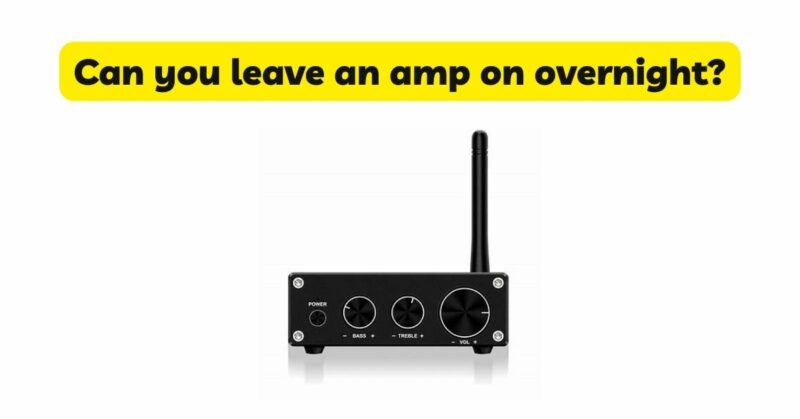Leaving an amplifier on overnight is a common practice for many audio enthusiasts. However, questions often arise regarding the implications and potential consequences of keeping an amp powered on for extended periods, especially during nighttime when it’s not in active use. This article aims to explore the pros and cons of leaving an amp on overnight, providing insights into the considerations and effects associated with this practice.
I. Benefits of Leaving an Amp On Overnight:
- Convenience: Keeping the amp on overnight allows for instant availability of audio the next morning. There’s no need to wait for the amplifier to power up before enjoying music or other audio content.
- Warm-up Time: Some audio enthusiasts argue that leaving the amp on overnight helps achieve optimal sound quality. They believe that keeping the amplifier warmed up continuously allows its components to stabilize, resulting in improved audio performance.
- Component Stability: Amplifiers consist of various electronic components, including capacitors, transistors, and resistors. Leaving the amp powered on continuously can potentially contribute to a stable operating environment for these components, reducing the stress caused by repeated power cycles.
II. Considerations When Leaving an Amp On Overnight:
- Energy Consumption: Leaving an amplifier on overnight results in continuous power consumption. The amount of energy consumed varies based on the amplifier’s power rating and efficiency. It is important to consider the environmental impact and associated costs when evaluating overnight usage.
- Component Lifespan: Continuous operation can contribute to wear and tear on internal components. Over time, electronic components may experience degradation due to prolonged exposure to electrical currents and thermal stress. It’s important to consider the potential impact on the overall lifespan of the amplifier.
- Heat Generation: Amplifiers generate heat during operation. Leaving an amp on overnight without proper ventilation or cooling mechanisms can potentially lead to excessive heat buildup. This can affect the performance of the amplifier and may even pose a risk of overheating and damage to the components.
III. Mitigating Risks and Best Practices:
- Power Management Features: Many modern amplifiers come equipped with power management features such as auto-standby or sleep modes. These features automatically put the amplifier into a low-power state after a period of inactivity, reducing energy consumption while maintaining convenience.
- Proper Ventilation: Ensure that the amplifier has sufficient airflow and is placed in a well-ventilated area. Adequate ventilation helps dissipate heat generated during operation, reducing the risk of overheating and maintaining optimal performance.
- Time-Based Usage: Consider your specific usage patterns and whether leaving the amp on overnight aligns with your needs. If you rarely use the amplifier during nighttime hours, it may be more energy-efficient to turn it off when not in use.
- Monitoring: Regularly check the temperature of the amplifier during overnight usage. If the amp feels excessively hot or shows signs of overheating, it may be necessary to reevaluate leaving it on overnight and consider alternative strategies to ensure component safety.
- Maintenance: Perform regular maintenance on the amplifier, including dusting off any accumulated debris, inspecting for signs of wear or damage, and addressing any maintenance tasks recommended by the manufacturer. Proper maintenance helps ensure optimal performance and longevity.
IV. Individual Considerations:
- Sound Quality Preferences: Some audiophiles argue that leaving an amp on overnight contributes to improved sound quality, while others may not notice a significant difference. Consider your personal preferences and whether you perceive any audible benefits when deciding whether to leave the amp on overnight.
- Energy Efficiency Goals: If energy conservation is a priority, it may be more practical to turn the amp off overnight to reduce unnecessary power consumption. Assess your energy usage and align it with your environmental values and energy-saving objectives.
Conclusion:
Leaving an amplifier on overnight offers the convenience of instant audio availability and potential sound quality benefits. However, it’s important to consider the energy consumption, component lifespan, and heat generation associated with continuous operation. By implementing best practices such as utilizing power management features, ensuring proper ventilation, monitoring temperature, and performing regular maintenance, you can strike a balance between convenience, sound quality, and energy efficiency. Assess your individual needs and preferences, and make an informed decision based on the specific characteristics of your amplifier and your overall goals as an audio enthusiast.


